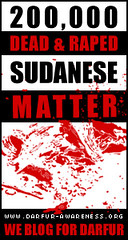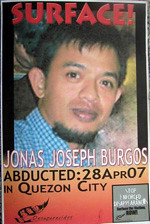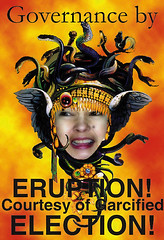The Defenders of the Oppressed Turned Oppressors?
While trying to search Philippine Congress on the recently passed House Bill 3793 regarding the amendment on Absentee Voting Law I chanced upon this very disturbing privilege Speech of Akbayan Party-List Rep. Hontiveros-Baraquel on Journal no. 66 Monday, March 10, 2008.
The revelation of Hontiveros-Baraquel paints a different picture wherein the New Peoples Army (NPA) supposedly the defenders of the oppressed are the very same people oppressing the oppressed all because they are in collusion with land owners willing to pay "revolutionary tax."
Note: Portions of the speech translation was done by the Jaywalker is not official and may not be accurate.
***************************************************
PRIVILEGE SPEECH OF
REP. HONTIVEROS-BARAQUEL
Ginang Speaker, mga kagalang-galang na kapwa Kinatawan, isang magandang hapon sa inyong lahat! (Madam Speaker, Honorable Representatives, to everyone good afternoon!)
There are three stories that need to be told and need to be heard today.
The first one is the story of Salvador “Boyet” Vale, Jr., a farmer-leader from Bgy. Royroy Batuan, Masbate leading a group of farmers petitioning for agrarian reform. On November 30, 2007, he was intercepted on his way to the farm, and was made to descend from his horse with the use of an armalite. He was forcibly dragged to a nearby house where he was tied up with heavy rope. Bound and gagged, the men took turns hitting him repeatedly with their armalites and punching him in his chest, back, shoulders and ears. After three hours of repeated abuse, he was fed two spoonfuls of rice. Before he was released, he was warned that the members of his organization should not pursue their desire to own the land that they till. The perpetrators were all known in the community as members of the New People’s Army or the NPA, the armed wing of the Communist Party of the Philippines (CPP).
Just one month later, on December 22, 2007, a recently elected barangay captain and farmer-leader of Samahang Magsasaka ng Hacienda Batuan in Masbate, one Mark Anthony “Butchoy” Vale, was killed by armed men and women at Sawang Batuan around one o’clock in the afternoon. His desecrated corpse, seen by his wife, was a gruesome mess and there was a total of three gunshot wounds on his body, and one on his head. His permit to carry firearms bore a bullet hole and was found next to his body, leading to the conclusion that the piece of paper was brought close to his head and the bullet was made to pass through it in a final act of mockery. According to his wife, Shiela, Ka Butchoy had been receiving text messages from a certain Ka Ricky, known to the community as a member of the NPA, discouraging the peasant organization from pursuing its land claims, in particular, the Petition for Leasehold filed before the Department of Agrarian Reform (DAR). It is a known fact that the landlord Rafael Resu-recion, has been paying revolutionary taxes to the NPA platoon in the area.
Meanwhile, in Sito Centro, Bgy. San Vicente San Narciso, Bondoc Peninsula, Quezon, on February 19 of this year, one Deolito “Julie” Empas, a farmer leader in the Uy landholding and a duly elected Kagawad, was abducted by armed men suspected of being members of the NPA. He was inside a small videoke bar in the barangay when armed men subdued him and tied his arms behind his back. They also forcibly dragged him to his house where he was made to surrender his things to his captors, including his licensed firearms. According to witnesses, he was trembling and looking extremely fearful.
Julie Empas is the farmer leader who re-placed Felizardo Benitez as the president of Samahan ng Magsasaka sa Sitio Centro, who, it can be recalled, was also slain by armed men affiliated with the NPA. Months before his abduction, Empas had intimated to his wife that he was being sent death threats by the NPA and the goons of the Uy family. He was abducted in the very same place that Benitez was killed.
Ito po ay tatlong kwento ng tatlong magsasaka sa lalawigan ng Quezon at Masbate – tatlong magsasakang namumuhay at nangangarap ng payak para sa kanilang sarili. Tatlong lider na nangahas ipaglaban ang karapatan sa lupa at ipaglaban ito sa gitna ng matinding hamon ng lipunan. Dahil buo pa rin ang pananalig sa sistema sa kabila ng maraming pagkabigo, tumakbo sila sa halalan sa pagnanais na lalong makatulong sa kanilang mga kasama. Si Boyet Vale at si Julie Empas ay mga nahalal na kagawad sa kanilang mga barangay sa Masbate at Quezon. Si Butchoy Vale naman ay isang barangay captain. ( This is the story of 3 farmers in the province of Quezon and Masbate - 3 farmers eking a living with simple dreams for themselves. 3 landless farmer leaders daring to fight for their right under the agrarian reform, a challenge to rise above societies inequalities. Firm believers of the systems despite its failures dares to run for local position to help fellow farmers. Boyet vale and Julie Empas was elected kagawad in their barangay in Masbate and Quezon. Butchoy vale was elected barangay captain.)
Much has been said about the plight of our farmers in the countryside. This is of course due in no small part to the fact that in June of this year, the Comprehensive Agrarian Reform Program (CARP), first set in place by RA 6657, is set to expire. Debates on its extension, as well as the possibility of inclusion of several peasant-friendly reforms, have resurfaced persistent historical problems in the peasant struggle. Onerous leaseback arrangements, farmland-as-collateral, stock distribution options – all these have figured prominently in discussions concerning the rights of our country’s farmers.
And yet, there is very little that has been said about the brazen killings, torture and abductions that are taking place in the countryside at the hands of those who profess to be defenders of the masses. In a tragic irony, these landlords—traditional elites, as they are often perceived – use the revolutionaries in order to protect their landed interests.
Sadly, this is not an isolated event, but rather, it is consistent with a pattern of peasant violence attributable to the NPA. As early as 2004, Julie Empas had already reported being the subject of continuous threats and intimidation from the NPA. Two sons of identified NPA member, Bobong Becamon, came into his house and told him to go with them to an undisclosed location. When Empas declined, the two men left; but Becamon soon appeared and partook of Em-pas’ morning meal, placing his magnum .357 beside him. He then reiterated his sons’ instructions. Empas replied that he cannot leave without any of his relatives accompanying him. The guerilla agreed and Empas hurriedly left for his brother’s house. His relatives, however, advised him not to go with Becamon and he left San Narciso that same night. The following day, several NPA militants entered his home and rummaged through his things—practically turning his house upside down, inside-out.
Ganito po ang pang-araw araw na buhay nilang magsasaka – nakasadlak sa kahirapan, kagutuman at kawalan ng lupang sarili, namumuhay pa sa takot, peligro at pangamba dulot ng pagsasanib ng masa-samang pwersa laban sa kanila. (This is how they exist on a daily basis - wretchedly poor, hunger and landless, living in fear in a dangerous environment brought about by evil forces fomenting terror against them.)
In 2003, Raymundo Tejino was killed and his death was claimed by the Maria Theresa De Leon Command of the New People’s Army. This command also accused Dioscoro Tejino of maintaining a private army and explicitly justified the attack on him and his family.
In its website, the Communist Party of the Philippines claimed responsibility for the attack and called both Raymundo and Dioscoro counter-revolutionaries. The joint monitoring committee of the National Democratic Front and the Government of the Republic of the Philippines has to date not acted with decisiveness on the complaint lodged by Dioscoro Tejino for murder and attempted murder. Dioscoro lives in perpetual fear for his life, but continues to fearlessly assert his rights even in the face of so many threats.
Indeed, agrarian reform cannot take place without agrarian justice and agrarian justice cannot take place without fundamental concepts of human rights. The obligations imposed by a rights-based framework are obligations not only on the State, but also on non-State actors.
Even as we join our voices in solidarity when non-combatants are being victimized by extrajudicial killings perpetrated by the State, we will not hesitate to call non-State actors on their own human rights violations – particularly when they are leveled against the weak and the vulnerable, the very same sectors they purport to represent and defend. Sadly, for the residents of Masbate and Bondoc Peninsula, the members of the NPA look virtually indistinguishable from the landlords who routinely abuse and take ad-vantage of them.
As we continue to press for a new and reform-oriented Agrarian Reform law this year, so too does AKBAYAN seek to remove the silence cloaking an issue that remains invisible where peasant rights are spoken of. There can be no social justice in a field of dead bodies.
We fight for their right to land. We fight for their right to life.
Maraming pong salamat, at magandang hapon po sa inyong lahat. (My gratitude and good afternoon to all)
The revelation of Hontiveros-Baraquel paints a different picture wherein the New Peoples Army (NPA) supposedly the defenders of the oppressed are the very same people oppressing the oppressed all because they are in collusion with land owners willing to pay "revolutionary tax."
Note: Portions of the speech translation was done by the Jaywalker is not official and may not be accurate.
***************************************************
PRIVILEGE SPEECH OF
REP. HONTIVEROS-BARAQUEL
Ginang Speaker, mga kagalang-galang na kapwa Kinatawan, isang magandang hapon sa inyong lahat! (Madam Speaker, Honorable Representatives, to everyone good afternoon!)
There are three stories that need to be told and need to be heard today.
The first one is the story of Salvador “Boyet” Vale, Jr., a farmer-leader from Bgy. Royroy Batuan, Masbate leading a group of farmers petitioning for agrarian reform. On November 30, 2007, he was intercepted on his way to the farm, and was made to descend from his horse with the use of an armalite. He was forcibly dragged to a nearby house where he was tied up with heavy rope. Bound and gagged, the men took turns hitting him repeatedly with their armalites and punching him in his chest, back, shoulders and ears. After three hours of repeated abuse, he was fed two spoonfuls of rice. Before he was released, he was warned that the members of his organization should not pursue their desire to own the land that they till. The perpetrators were all known in the community as members of the New People’s Army or the NPA, the armed wing of the Communist Party of the Philippines (CPP).
Just one month later, on December 22, 2007, a recently elected barangay captain and farmer-leader of Samahang Magsasaka ng Hacienda Batuan in Masbate, one Mark Anthony “Butchoy” Vale, was killed by armed men and women at Sawang Batuan around one o’clock in the afternoon. His desecrated corpse, seen by his wife, was a gruesome mess and there was a total of three gunshot wounds on his body, and one on his head. His permit to carry firearms bore a bullet hole and was found next to his body, leading to the conclusion that the piece of paper was brought close to his head and the bullet was made to pass through it in a final act of mockery. According to his wife, Shiela, Ka Butchoy had been receiving text messages from a certain Ka Ricky, known to the community as a member of the NPA, discouraging the peasant organization from pursuing its land claims, in particular, the Petition for Leasehold filed before the Department of Agrarian Reform (DAR). It is a known fact that the landlord Rafael Resu-recion, has been paying revolutionary taxes to the NPA platoon in the area.
Meanwhile, in Sito Centro, Bgy. San Vicente San Narciso, Bondoc Peninsula, Quezon, on February 19 of this year, one Deolito “Julie” Empas, a farmer leader in the Uy landholding and a duly elected Kagawad, was abducted by armed men suspected of being members of the NPA. He was inside a small videoke bar in the barangay when armed men subdued him and tied his arms behind his back. They also forcibly dragged him to his house where he was made to surrender his things to his captors, including his licensed firearms. According to witnesses, he was trembling and looking extremely fearful.
Julie Empas is the farmer leader who re-placed Felizardo Benitez as the president of Samahan ng Magsasaka sa Sitio Centro, who, it can be recalled, was also slain by armed men affiliated with the NPA. Months before his abduction, Empas had intimated to his wife that he was being sent death threats by the NPA and the goons of the Uy family. He was abducted in the very same place that Benitez was killed.
Ito po ay tatlong kwento ng tatlong magsasaka sa lalawigan ng Quezon at Masbate – tatlong magsasakang namumuhay at nangangarap ng payak para sa kanilang sarili. Tatlong lider na nangahas ipaglaban ang karapatan sa lupa at ipaglaban ito sa gitna ng matinding hamon ng lipunan. Dahil buo pa rin ang pananalig sa sistema sa kabila ng maraming pagkabigo, tumakbo sila sa halalan sa pagnanais na lalong makatulong sa kanilang mga kasama. Si Boyet Vale at si Julie Empas ay mga nahalal na kagawad sa kanilang mga barangay sa Masbate at Quezon. Si Butchoy Vale naman ay isang barangay captain. ( This is the story of 3 farmers in the province of Quezon and Masbate - 3 farmers eking a living with simple dreams for themselves. 3 landless farmer leaders daring to fight for their right under the agrarian reform, a challenge to rise above societies inequalities. Firm believers of the systems despite its failures dares to run for local position to help fellow farmers. Boyet vale and Julie Empas was elected kagawad in their barangay in Masbate and Quezon. Butchoy vale was elected barangay captain.)
Much has been said about the plight of our farmers in the countryside. This is of course due in no small part to the fact that in June of this year, the Comprehensive Agrarian Reform Program (CARP), first set in place by RA 6657, is set to expire. Debates on its extension, as well as the possibility of inclusion of several peasant-friendly reforms, have resurfaced persistent historical problems in the peasant struggle. Onerous leaseback arrangements, farmland-as-collateral, stock distribution options – all these have figured prominently in discussions concerning the rights of our country’s farmers.
And yet, there is very little that has been said about the brazen killings, torture and abductions that are taking place in the countryside at the hands of those who profess to be defenders of the masses. In a tragic irony, these landlords—traditional elites, as they are often perceived – use the revolutionaries in order to protect their landed interests.
Sadly, this is not an isolated event, but rather, it is consistent with a pattern of peasant violence attributable to the NPA. As early as 2004, Julie Empas had already reported being the subject of continuous threats and intimidation from the NPA. Two sons of identified NPA member, Bobong Becamon, came into his house and told him to go with them to an undisclosed location. When Empas declined, the two men left; but Becamon soon appeared and partook of Em-pas’ morning meal, placing his magnum .357 beside him. He then reiterated his sons’ instructions. Empas replied that he cannot leave without any of his relatives accompanying him. The guerilla agreed and Empas hurriedly left for his brother’s house. His relatives, however, advised him not to go with Becamon and he left San Narciso that same night. The following day, several NPA militants entered his home and rummaged through his things—practically turning his house upside down, inside-out.
Ganito po ang pang-araw araw na buhay nilang magsasaka – nakasadlak sa kahirapan, kagutuman at kawalan ng lupang sarili, namumuhay pa sa takot, peligro at pangamba dulot ng pagsasanib ng masa-samang pwersa laban sa kanila. (This is how they exist on a daily basis - wretchedly poor, hunger and landless, living in fear in a dangerous environment brought about by evil forces fomenting terror against them.)
In 2003, Raymundo Tejino was killed and his death was claimed by the Maria Theresa De Leon Command of the New People’s Army. This command also accused Dioscoro Tejino of maintaining a private army and explicitly justified the attack on him and his family.
In its website, the Communist Party of the Philippines claimed responsibility for the attack and called both Raymundo and Dioscoro counter-revolutionaries. The joint monitoring committee of the National Democratic Front and the Government of the Republic of the Philippines has to date not acted with decisiveness on the complaint lodged by Dioscoro Tejino for murder and attempted murder. Dioscoro lives in perpetual fear for his life, but continues to fearlessly assert his rights even in the face of so many threats.
Indeed, agrarian reform cannot take place without agrarian justice and agrarian justice cannot take place without fundamental concepts of human rights. The obligations imposed by a rights-based framework are obligations not only on the State, but also on non-State actors.
Even as we join our voices in solidarity when non-combatants are being victimized by extrajudicial killings perpetrated by the State, we will not hesitate to call non-State actors on their own human rights violations – particularly when they are leveled against the weak and the vulnerable, the very same sectors they purport to represent and defend. Sadly, for the residents of Masbate and Bondoc Peninsula, the members of the NPA look virtually indistinguishable from the landlords who routinely abuse and take ad-vantage of them.
As we continue to press for a new and reform-oriented Agrarian Reform law this year, so too does AKBAYAN seek to remove the silence cloaking an issue that remains invisible where peasant rights are spoken of. There can be no social justice in a field of dead bodies.
We fight for their right to land. We fight for their right to life.
Maraming pong salamat, at magandang hapon po sa inyong lahat. (My gratitude and good afternoon to all)

























0 Speak Out:
Post a Comment